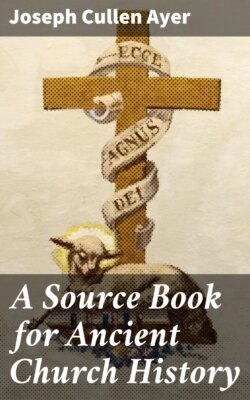Читать книгу A Source Book for Ancient Church History - Joseph Cullen Ayer - Страница 74
На сайте Литреса книга снята с продажи.
(c) Justin Martyr, Apologia, II, 10, 13. (MSG, 6:459, 466.)
ОглавлениеCh. 10. Our doctrines, then, appear to be greater than all human teaching; because Christ who appeared for our sakes, [pg 073] became the whole rational being,35 body and reason and soul. For whatever either law-givers or philosophers uttered well they elaborated by finding and contemplating some part of the Logos. But since they did not know the whole of the Logos, which is Christ, they often contradicted themselves. And those who by human birth were more ancient than Christ, when they attempted to consider and prove things by reason, were brought before the tribunals as impious persons and busybodies. And Socrates, who was more zealous in this direction than all of them, was accused of the very same crimes as ourselves. For they said that he was introducing new divinities, and did not consider those to be gods whom the State recognized. But he cast out from the State both Homer and the rest of the poets, and taught men to reject the wicked demons and those who did the things which the poets related; and he exhorted them to become acquainted with the God who was unknown to them, by means of the investigation of reason, saying, “That it is not easy to find the Father and Maker of all, nor, having found Him, is it safe to declare Him to all.”36 But these things our Christ did through His own power. For no one trusted in Socrates so as to die for this doctrine, but in Christ, who was partially known even by Socrates (for He was and is the Logos who is in every man, and who foretold the things that were to come to pass both through the prophets and in His own person when He was made of like passions and taught these things), not only philosophers and scholars believed, but also artisans and people entirely uneducated, despising both glory and fear and death; since He is the power of the ineffable Father, and not the mere instrument of human reason.37
Ch. 13. … I confess that I both boast and with all my strength strive to be found a Christian; not because the teachings of Plato are different from those of Christ, but [pg 074] because they are not in all respects similar, as neither are those of others, Stoics, poets, and historians. For each man spoke well in proportion to the share he had of the spermatic divine Logos, seeing what was related to it. But they who contradict themselves on the more important points appear not to have possessed the heavenly wisdom and the knowledge which cannot be spoken against. Whatever things were rightly said among all men are the property of us Christians. For next to God we worship and love the Logos, who is from the unbegotten and ineffable God, since also He became man for our sakes, that, becoming a partaker of our sufferings, He might also bring us healing. For all the writers were able to see realities darkly through the sowing of the implanted Logos that was in them. For the seed of anything and a copy imparted according to capacity [i.e., to receive] is one thing, and quite another is the thing itself, of which there is the participation and imitation according to the grace which is from Him.
